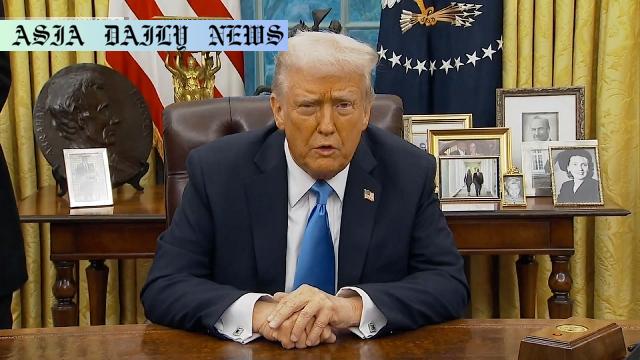Refugees: The US accepts white South Africans fleeing discrimination amid controversy over Trump’s policies.
The Trump administration has accepted white South Africans claiming persecution.
South Africa denies accusations of racial discrimination and genocide.
The US Democrats criticize selective refugee policies under Trump’s leadership.
Trump administration freezes foreign aid to South Africa citing land policies.

Trump Administration Offers Refuge to White South African Afrikaners
The Trump administration’s decision to accept approximately 60 white South Africans, called Afrikaners, as refugees has sparked heated criticism and opened a debate about selective refugee policies in the United States. Citing claims of racial discrimination and alleged violence targeting this group in their homeland, Trump has referred to their situation as a “genocide.” This move aligns with his administration’s critical stance on South Africa’s controversial land expropriation policies which, according to Trump, unfairly target the country’s minority white population. Trump, expressing concern over human suffering, paused to stress that racial considerations did not determine his decision; instead, it was the alleged human rights crisis faced by this community.
South Africa Disputes Claims and Defends Land Expropriation Policies
The South African government has categorically denied any allegations of genocide or racially motivated policies. The land expropriation policy, introduced in early 2023, aims to redistribute land to historically disadvantaged black South Africans. Officials argue that these measures are necessary to address decades of systemic inequality stemming from apartheid. Nevertheless, the policy has become a flashpoint for international criticism. The Trump administration has used this as grounds to freeze US foreign aid to South Africa, further straining bilateral relations. Despite these tensions, South Africa remains steadfast that its policies serve justice and are not motivated by racial prejudice.
US Democrats Condemn Selective Refugee Policies
While some conservatives have applauded the move as humane and timely, Democrats have raised concerns over the administration’s selective stance on refugees. Critics point out that Afrikaners were admitted under Trump’s refugee acceptance program, yet the administration has severely curtailed resettlements of others facing conflicts, such as those from war-torn regions in the Middle East, Latin America, and Africa. Opponents argue that Trump’s refugee policies reflect racial biases, as non-white groups often face detention or deportation. This duality, they claim, undermines the credibility of the US as a nation committed to human rights more broadly.
A Complicated Global Debate
The implications of this decision stretch far beyond US borders. For South Africa, accusations of genocide threaten its international image and economic relationships. Globally, human rights watchdogs have sought clarity on the Trump administration’s vetting process, questioning whether this policy is driven by factual urgency or political convenience. The initiative has raised broader questions about how nations prioritize refugees, exposing inconsistencies in global refugee programs. While there is acknowledgment that Afrikaners may face challenges in South Africa, many experts point out that the term “genocide” appears exaggerated without substantive evidence. Consequently, this development has amplified ideological divides over how the West treats minority groups versus historically marginalized populations.
As the situation unfolds, it remains to be seen how this decision will shape Trump’s legacy and US-South Africa relations. Will this set a precedent for future selective immigration decisions under humanitarian pretenses or further polarize global dialogue on racial justice?



Commentary
A Divisive Refugee Policy Reflecting Broader Challenges
President Donald Trump’s decision to accept a group of white South African Afrikaners as refugees is emblematic of his administration’s controversial approach to immigration and refugee resettlement. The move has invoked both praise and criticism, depending on one’s political perspective. On one hand, supporters see it as a necessary step to protect a minority group facing alleged persecution. On the other hand, skeptics argue that this decision exposes underlying racial dynamics in US refugee policy, questioning the administration’s priorities when addressing human suffering.
The Underlying Issue of Land Redistribution in South Africa
At the heart of the controversy lies South Africa’s land redistribution policy, a contentious issue with deep historical roots. For decades, systemic racial inequality and segregation under apartheid allowed the white minority to own the vast majority of arable land in South Africa. The government’s recent policies aim to rectify those disparities, but their approach has generated fierce international debate. While some argue these measures are overdue and aim to promote justice, others, including Trump, have painted them as discriminatory and detrimental to the rights of the white minority.
The Broader Impact of Selective Refugee Policies
Beyond South Africa’s borders, this decision reflects the challenges of governing a comprehensive and equitable refugee policy. By focusing on the plight of the Afrikaners, the Trump administration risks alienating other groups facing comparable or even greater dangers. Refugee advocates may view this selective approach as undermining fairness and global solidarity in addressing humanitarian concerns. However, Trump’s vocal stance on protecting this group also sheds light on the difficulties smaller communities face when their plight fails to reach the international stage.
As we navigate increasingly polarized global dialogues on race, equality, and human rights, this development compels deeper reflection. Governments worldwide must balance the principles of justice and equity with the practical demands of policymaking. One can only hope that such decisions contribute positively towards these pressing global challenges.